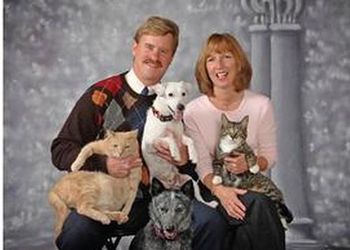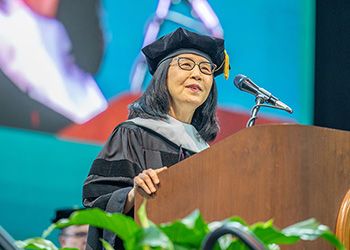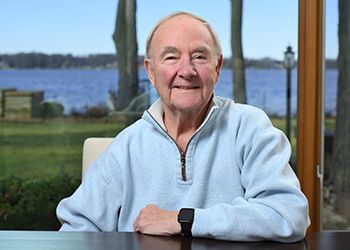Changing pet peeves into creature comforts

Dr. Matthew Beal traverses MSU’s Veterinary Teaching Hospital (VTH) discussing cases with residents and students, stopping to monitor several patients—some via web cams—as he hustles to direct critical care.
He signs discharge papers and gives final instructions for George, who due to a rare vascular anomaly in his liver, came from Canada to the hospital, one of only a few places in the world equipped to treat him. George’s family takes the opportunity to snap a picture of their tailwagging, seven-month-old puppy with the doctor who helped save his life.
Beal, chief of staff of the VTH, is part of an emergency and critical care team that simultaneously advances education, research and medical care for small animals while working closely with specialists across MSU’s College of Veterinary Medicine to provide a breadth of expertise unmatched in the state.
But he’s doing it in a decades-old facility. That’s something donors like Dr. Kurt Dunckel (’78, Natural Science; ’82, Veterinary Medicine) are helping to change. Dunckel’s recent cash gift of $250,000 has kicked off a fundraising campaign in a powerful way, beginning the process of turning dreams of renovation into reality.
Advancing all of veterinary medicine
Now, proposed emergency critical care facility renovations will advance CVM’s commitment to providing the finest care for veterinary patients, world-renowned veterinary education and hands-on research to enhance treatments for animal and human health.
Supporting the renovations appealed to Dunckel because he knew the project would benefit the whole spectrum of veterinary medicine, from care to teaching to research. He chose to make a cash gift in order to effect change quickly.
More than 5,000 patients each year are seen in the Emergency and Critical Care Medicine (ECCM) service in the hospital. The current hospital was built in 1965 and no major renovations have been made to the emergency critical care area since then.
“The renovation will help pets and their owners as well as advance veterinary medicine,” Dunckel says. “It gives students great experience in dealing with emergency health needs of animals but also experience in many other areas of the clinic as they follow-up with their cases.”
Many ECCM cases move through different services within the hospital.
“One of the things our service prides itself on is really getting our students very involved in all the cases,” says Beal. “This new space will benefit teaching because it brings everything together. Right now everything is compartmentalized, and being able to have the students with us all the time to see everything and be involved in everything will be positive as well. We’ve got all these different specialists, high levels of expertise in different areas that can come together and create the positive outcomes that we want to see in our patients.”
Integrating people, technology and space
Consolidated space and a circular floor plan are the foundation of the planned renovations. Currently, ECCM patients are housed in several areas and the new design will allow caregivers to more efficiently monitor all patients at all times.
“The space was constructed in the mid ’60s and although the infrastructure itself hasn’t changed, the people around it have changed, the caseload has skyrocketed and the things that we can do nowadays have far surpassed the physical plant that we have here,” Beal says. “The new space will allow us to integrate the people, the technology and the space together to create those good outcomes.”
Among the new features will be skylights to offer natural light, a known factor in helping animals recover and heal.
The open plan accommodates an isolation ward within view of caregivers but with separate ventilation for patients with infectious diseases, respiratory and gastrointestinal problems.
The expansion will allow space for optimal management of patients undergoing advanced treatment modalities, around-the clock monitoring and advanced critical care to critical-condition patients being treated by specialists in other parts of the hospital in addition to emergency patients.
“Michigan State’s Veterinary Teaching Hospital is special; it’s not just because of the individual services and their strengths, but how everybody works together,” says Beal. “The team approach here is wonderful because everybody can use their expertise to affect a positive outcome.”
Driving innovation
VTH has built a reputation for delivering the most advanced and innovative patient care. The team’s commitment to patients— using whatever works—drives innovations.
Along with expertise and technology, the rapid transition of research results into the clinical setting is saving lives every day at the VTH. Across the college, research projects are advancing knowledge in specialty areas of veterinary medicine including ophthalmology, oncology, cardiology and interventional radiology—all of which may be important contributors to the treatment of patients who come through the emergency room doors.
Kurt Dunckel has been serving veterinary needs of the Davison community for more than 30 years. He knows well the importance of research and new treatments.
In 1991, together with his wife Debbie, he opened Dunckel Veterinary Hospital. The practice expanded to five members and continues to provide comprehensive pet care services, including wellness care, orthopedic and laser pet surgery, emergency and critical care, pet dental care, boarding and grooming services and pet vaccinations.
“I love veterinary medicine,” he says. “Vets deal with such a wide variety of physiological and behavioral issues. I still get a kick out of seeing animals every day. The ECCM is on the forefront of helping us to do our jobs better.”
Making it happen
Giving back has long been important to Kurt. He has been a member of the Davison Optimist Club for 21 years and a Big Brother for 11 years. He is the past president of the Saginaw Valley Veterinary Medical Association and currently is on the board of the Michigan Veterinary Medical Association, serving on its investment committee.
Kurt’s father and grandfather were both MSU graduates; his father also graduated from CVM. Kurt and Debbie’s sons have carried on the tradition. Dunckel blood is green, Kurt says. He and Debbie even have a cat named Sparty.
“Going through Michigan State for eight years certainly helped me grow and contribute to society and my profession,” he says. “I’ve done well, and I wanted to make a gift that I knew would make a difference.”
The Emergency and Critical Care service at VTH also provides a unique opportunity for research, says CVM Dean Dr. Christopher Brown. “This renovation project is a key step in increasing our understanding of animals under acute physical stress. This understanding, in turn, will lead to discoveries that improve animal health, and human health as well.”
“We are grateful to Kurt Dunckel for his generosity and vision,” he says.
Beal agrees.
“This is a space we’ve wanted to work on for 13 years, and every year it seemed like there was something a little bit more pressing,” he notes. “About three years ago, we decided we needed to make this happen for the sake of the patients, student education, and the people that are working here. I think we’re going to get there and I’m super excited because it will be a space to be proud of that I think will help our patients turn around faster.”
Says Kurt Dunckel: “This is such a good project to contribute to. Once we get it over the hump and to reality, it will have an immediate, big impact. There aren’t many opportunities like this where a contribution can help so many, including pets, people and organizations, in so many ways.”
For more information making a gift tothe ECCM Campaign in the College of Veterinary Medicine, contact Assistant Director of Development Tracey Zambeck at zambeckt@cvm.msu.edu or by calling (517) 353-7891.




